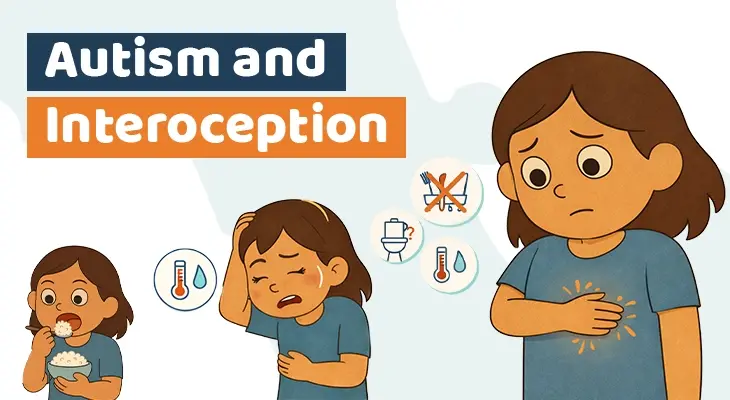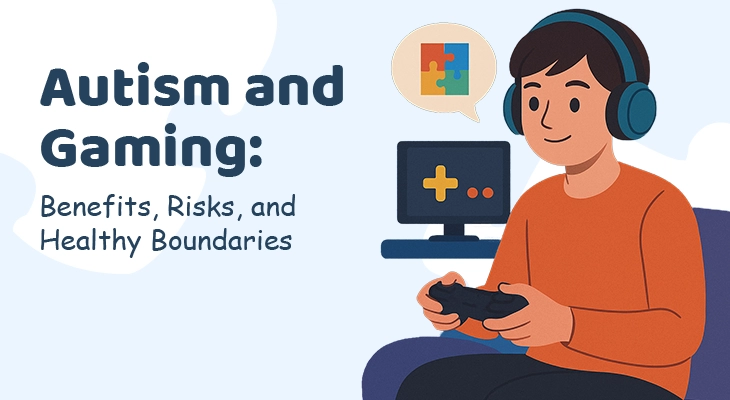Exploring Common Comorbidities in Autism
Many medical conditions are accompanied by the presence of additional conditions, referred to as “comorbidities” or “comorbid conditions”.
Autism Spectrum Disorder (ASD) is no exception to this rule. Research suggests a strong link between ASD and various comorbidities. While it’s important to remember that not every child on the autism spectrum will experience these additional challenges, a significant portion do.
This blog explores the landscape of common comorbidities associated with ASD.
Condition of Abnormal Folate Metabolism Comorbid to Autism
Research suggests that problems with folate metabolism are common in individuals with Autism Spectrum Disorder (ASD). This can lead to reduced production of important molecules and hinder folate transport to the brain and neurons. [9]
- Autoantibodies as a Culprit: The presence of autoantibodies against folate receptors (FRα) seems to be a significant factor. These antibodies can block FRα function, further limiting folate uptake in the brain.
- High Prevalence: Studies have found high percentages (up to 60%) of children with ASD test-positive for these FRα autoantibodies.
- Treatment Potential: Many children with ASD and confirmed cerebral folate deficiency show significant clinical improvement when treated with Folinic Acid, a form of a reduced folate.
- Promising Results: Case studies involving children with severe autism and cerebral folate deficiency report complete symptom reduction or substantial improvements in communication with Folinic Acid treatment.
Mental Health Disorders Comorbid to Autism
As per National Institutes of Health [1], Intellectual disability (ID) and Autism Spectrum disorder (ASD) are the most common developmental disorders present in humans. Combined, they affect between 3-5% of the population.
Autism is most often but not exclusively, linked with intellectual disabilities, ADHD, OCD, and childhood-onset schizophrenia.
Obsessive-Compulsive Disorder (OCD)
Around 17% of individuals with autism also experience OCD [2]. Furthermore, studies suggest that those diagnosed with autism have a two-fold higher risk of developing OCD later in life [3]
Intellectual Disability
Approximately 56% of individuals on the spectrum have a co-occurring intellectual disability [4]
Attention Deficit Hyperactivity Disorder (ADHD)
Estimates suggest 30% to 50% of people with autism also have ADHD [5]
Mental Health Concerns
Autistica [7] reports that a staggering 79% of autistic adults also grapple with mental health challenges, such as depression.
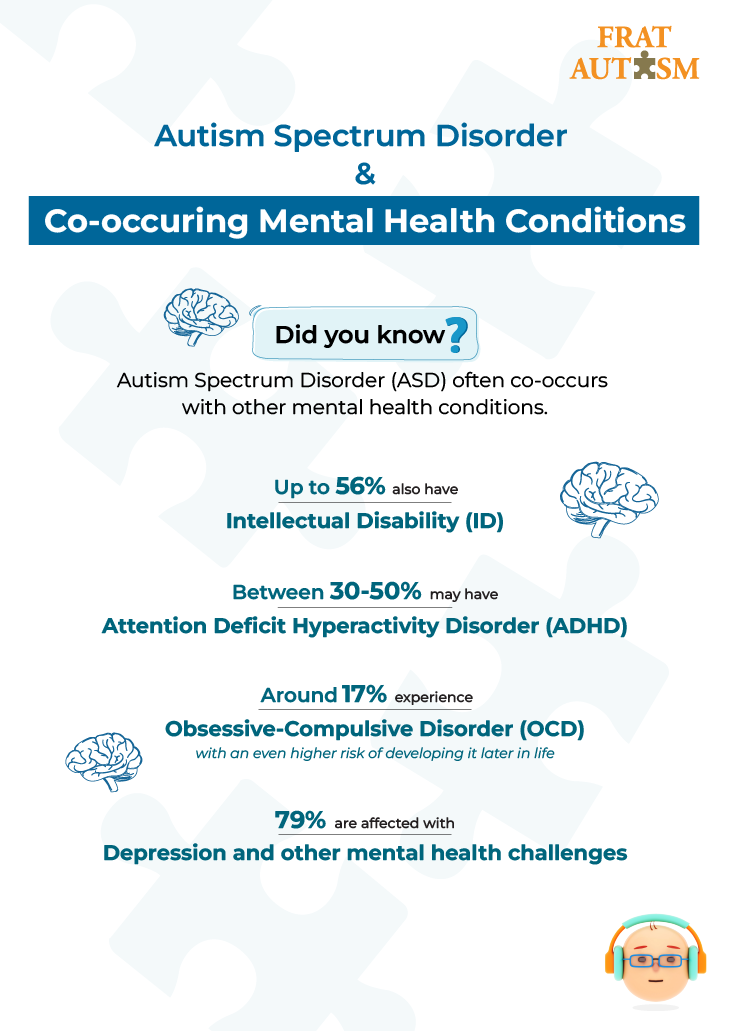
Download Download & share this infograph card in your network [Free Download]
Genetic Disorders Comorbid to Autism
Certain genetic disorders are known to significantly increase the risk of autism. This section explores some of the key genetic disorders that frequently appear alongside ASD, highlighting the prevalence rates and potential symptom interactions.
Fragile X Syndrome (FXS)
Fragile X Syndrome (FXS) stands out as the most common single-gene cause of Autism Spectrum Disorder (ASD). It’s estimated to affect 2-3% of all diagnosed ASD cases. Interestingly, the relationship goes both ways, with 25-33% of individuals with FXS also exhibiting symptoms of ASD. This highlights the complex interplay between these conditions. [8]
Down Syndrome (DS)
Down syndrome (DS) is a relatively uncommon genetic disorder, affecting approximately 1 in 800 births. However, for those diagnosed with DS, the risk of also having Autism Spectrum Disorder (ASD) is significantly higher. Studies suggest that up to 40% of children with DS may also exhibit symptoms of ASD. This highlights the potential for co-occurring conditions in individuals with DS. [8]
Tuberous Sclerosis Complex (TSC)
Tuberous Sclerosis Complex (TSC) is another genetic disorder with a significant link to Autism Spectrum Disorder (ASD). The prevalence of ASD in individuals with TSC varies between 26% and 45%. This range highlights the influence of other factors on the co-occurrence of these conditions. Research suggests that the presence and severity of brain lesions, along with the type and frequency of seizures, can play a role in increasing the risk of developing ASD in someone with TSC. [8]
Duchenne Muscular Dystrophy (DMD)
Prevalence not quantified, but toe-walking in autistic children warrants checking creatine phosphokinase levels to rule out DMD. [8]
Neurofibromatosis Type I (NF1)
Studies inconclusive, with some suggesting increased ASD symptoms but potentially due to co-occurring ADHD. [8]
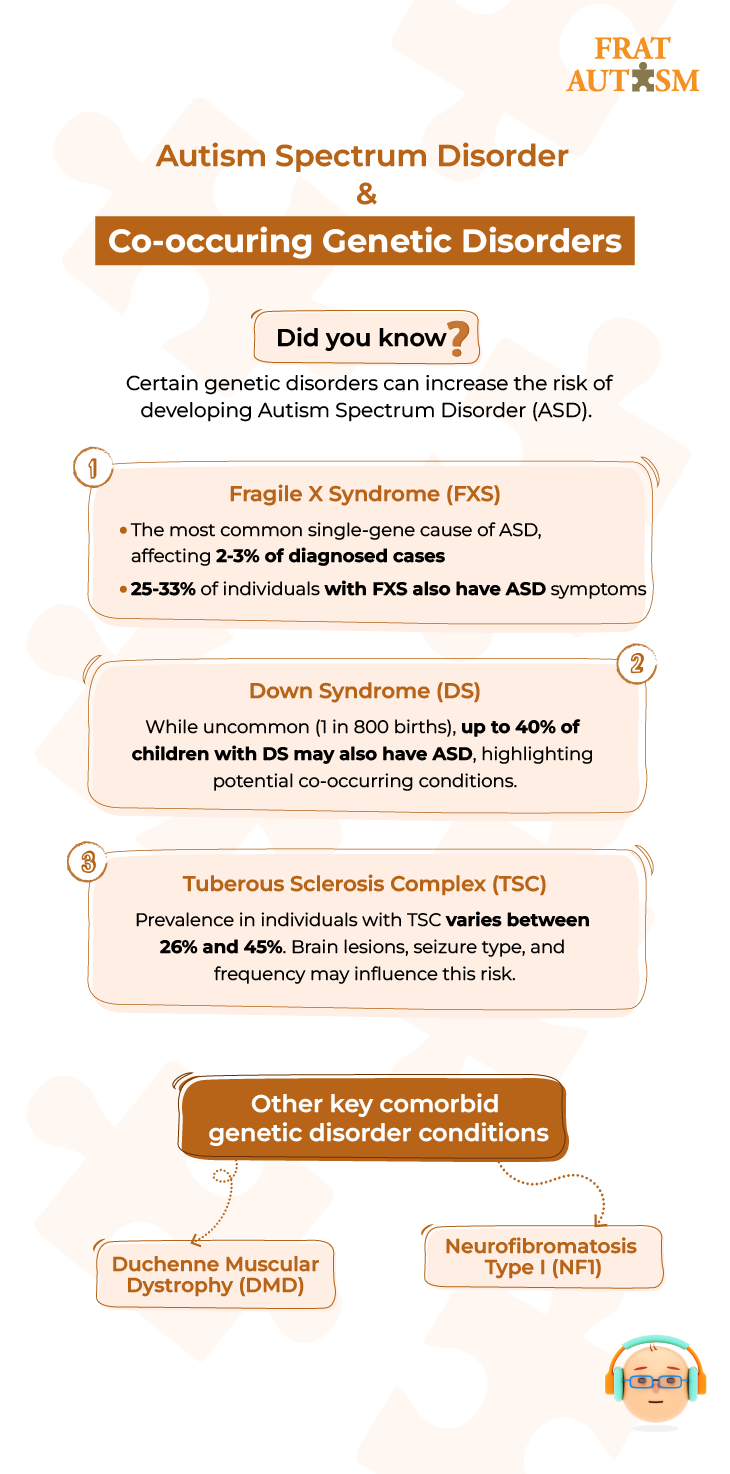
Download Download & share this infograph card in your network [Free Download]
Neurological Disorders Comorbid to Autism
Children with Autism Spectrum Disorder (ASD) are more likely to experience neurological disorders compared to the general population. Here’s a breakdown:
Epilepsy
This brain disorder causes unpredictable changes in mental state and recurrent seizures. Up to 40% of children with ASD may have epilepsy, and conversely, 8% of epileptic children have ASD. [8] The risk of epilepsy in ASD increases with intellectual disability and female gender.
Macrocephaly and Hydrocephalus
Children with autism may experience conditions like macrocephaly (abnormally large head size) or hydrocephalus (excess fluid buildup in the brain). While the exact prevalence remains unclear, a link between these conditions and autism has been established.
Cerebral Palsy
This movement disorder, affecting muscle tone, coordination, and balance, is a known comorbidity with autism. However, the specific prevalence rate requires further investigation.
Migraines and Headaches
Headaches and migraines are frequent occurrences in individuals with autism. People with autism are 2.2 times more likely to have severe headaches.
Congenital Nervous System Abnormalities
Birth defects impacting the brain or spinal cord fall under this category. While a link to autism exists, data on the specific prevalence rate is currently unavailable.
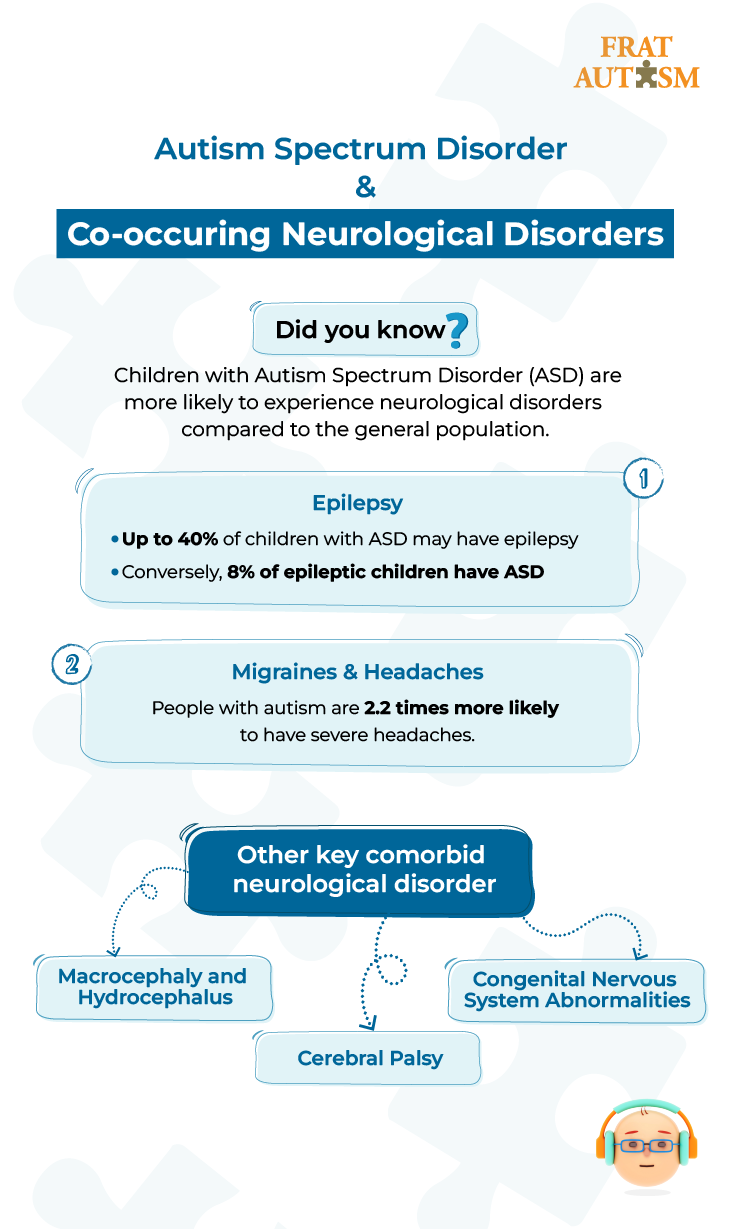
Download Download & share this infograph card in your network [Free Download]
Medical Disorders Comorbid to Autism
Medical comorbidities are more common in children with autism spectrum disorders (ASD) than in the general population.
Skin Allergies
People with autism are 1.6 times more likely to have eczema or skin allergies
Asthma
People with autism are 1.8 times more likely to have asthma
Food Allergies
People with autism are 1.8 times more likely to have food allergies
Ear Infections
People with autism are 2.1 times more likely to have frequent ear infections
Diarrhea or Colitis
People with autism are 3.5 times more likely to have diarrhea or colitis
Gastrointestinal (GI) Problems
People with autism are 7 times more likely to report gastrointestinal (GI) problems and occur in 46% to 84% of them.
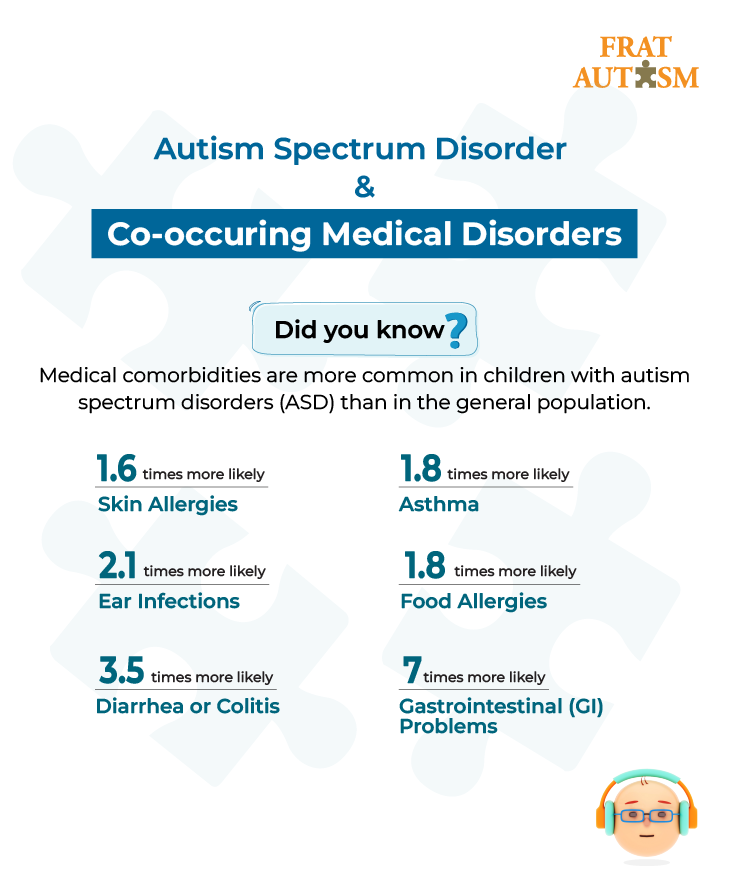
Download Download & share this infograph card in your network [Free Download]
Sleep Disorders Comorbid to Autism
Sleep disorders are a significant problem in individuals with autism, occurring in about 80% of them. Sleep disturbances can manifest as difficulty falling asleep, staying asleep, night time waking, sleepwalking, and contribute to learning issues, hyperactivity, inattention, anxiety, aggression, and even health problems.
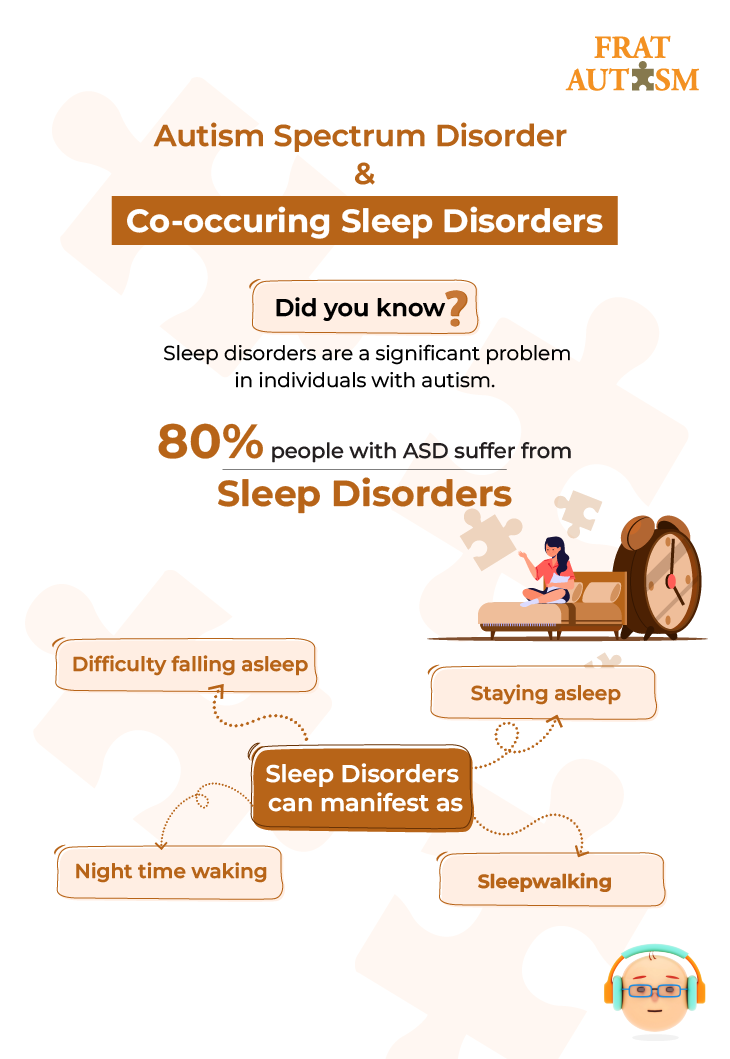
Download Download & share this infograph card in your network [Free Download]
Conclusion
Autism Spectrum Disorder (ASD) is a multifaceted condition, and its impact can extend beyond the core social and communication challenges. This blog explored the landscape of common comorbidities associated with ASD, highlighting the importance of understanding these co-occurring conditions for a more comprehensive approach to treatment and support.
Key Takeaways
- ASD frequently co-occurs with various medical, neurological, genetic, and mental health conditions.
- Early diagnosis and intervention for both ASD and any comorbid conditions are crucial for optimal outcomes.
- The specific prevalence rates for some comorbidities can vary, but research sheds light on significant potential overlaps.
- A personalized approach that considers individual needs and co-occurring conditions is essential for effective management.
References
- NIH, Intellectual Disability and Autism Spectrum Disorders: Causal Genes and Molecular Mechanisms
- NIH, Anxiety Disorders in Children and Adolescents with Autistic Spectrum Disorders: A Meta-Analysis
- NIH (PubMed), Obsessive-Compulsive Disorder and Autism Spectrum Disorders: Longitudinal and Offspring Risk
- Oxford Academic (Brain) – Clinical and neural effects of six-week administration of oxytocin on core symptoms of autism
- Frontiers in Human Neuroscience, The co-occurrence of autism and attention deficit hyperactivity disorder in children – what do we know?
- Taylor & Francis Online, Epilepsy in patients with autism: links, risks and treatment challenges
- Autistica, Depression and Autism
- NIH, Autism medical comorbidities
- Wikipedia, Conditions comorbid to autism spectrum disorders



